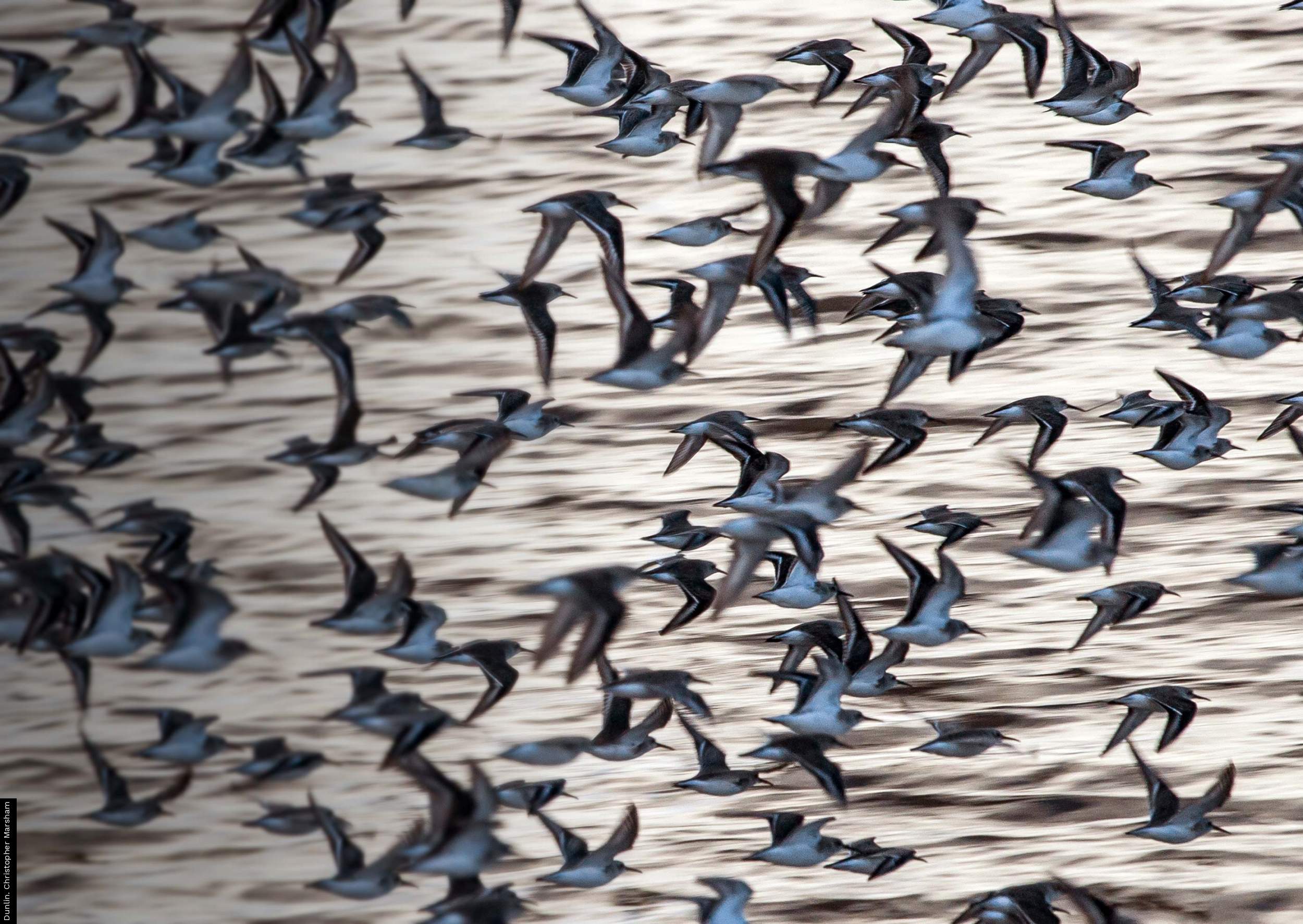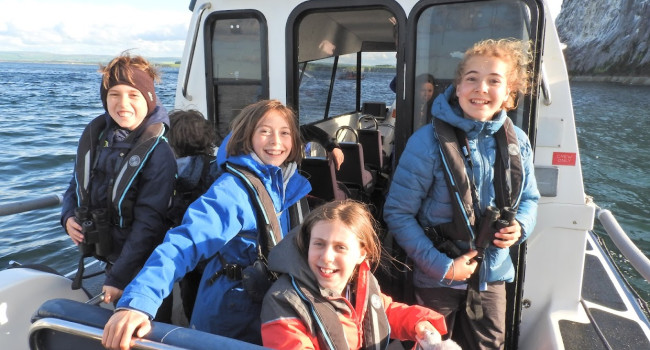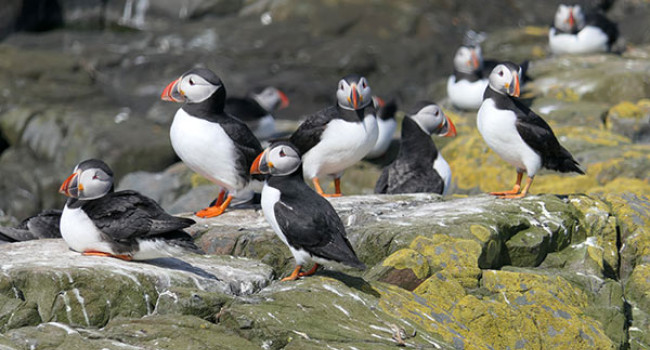Breeding Bird Survey celebrates 30 years of citizen science in Northern Ireland
16 May 2024 | No. 2024-18
Published today, the latest BTO/JNCC/RSPB Breeding Bird Survey (BBS) Report looks at the fortunes of our bird populations in Northern Ireland and across the UK, and celebrates the Pearl Anniversary of a pioneering volunteer-led national study.
This press release is specific to Northern Ireland. Alternatively, view the press release for:
The report shows continued increases for such species as Goldfinch and Buzzard in Northern Ireland while also revealing continued severe declines for other birds, including Skylark and Swallow.
BBS is the main scheme for monitoring the population changes of the UK’s common and widespread breeding birds, producing population trends for 38 species in Northern Ireland.
During the breeding season, birds are at their busiest and wherever we may live, there will be a nest not too far away. Whether it is a Blackbird in the park or a Mallard with ducklings on the local canal, many of us can witness the frenzied activity that this season brings.
For some birdwatchers, however, this is not just a time to casually observe these annual rituals, but it signifies a period of dedicated information gathering. And for 30 years, a total of nearly 9,000 skilled enthusiasts have been contributing essential data to the Breeding Bird Survey (BBS), one of the UK’s longest-running citizen science initiatives. The BBS is a partnership project organised by the British Trust for Ornithology (BTO), the Joint Nature Conservation Committee (JNCC) and the Royal Society for the Protection of Birds (RSPB).
With dedicated volunteers taking part each spring and summer, Northern Ireland’s birders have provided almost a quarter of a million records since the BBS was launched in 1994, allowing scientists to identify any notable changes in the status of our breeding birds. In an effort to better understand shifts in the populations of birds across Northern Ireland, BTO is seeking more volunteers to help gather this vital information. Birdwatchers are being asked to sign up to help provide the essential information that will help paint a more accurate picture of the country’s avian landscape.
The BBS gathers information from across the UK and helps provide details of just how well, or not, the UK’s birds are faring. By analysing the collected data, scientists can see that while some birds such as Goldfinch, Buzzard and Blackcap are doing well in Northern Ireland, others including Skylark, Swallow and Chaffinch are in steep decline. The reasons for these population changes are varied and the survey data allow scientists to investigate the potential drivers for change for each species.
Since the start of BBS, the data have shown that Blackcap, a migratory warbler that visits in the summer, has increased in Northern Ireland by a staggering 1795% while once common birds such as Greenfinch have declined by more than 80%. Of the 38 common and widespread species monitored by BBS in Northern Ireland, two – Skylark and Greenfinch – have decreased significantly since 1995.
| Losses | % loss | Gains | % gain |
| Greenfinch | -81 | Blackcap | +1,795 |
| Skylark | -38 | Buzzard | +1,169 |
| Linnet | -35 (2002 – 2022) | Goldfinch | +565 |
Dr Jemma Davies, Engagement Coordinator for BTO Northern Ireland, said: “We often find ourselves saying that the work of BTO wouldn't be possible without the volunteers who generously give of their time and skills to help us collect data. We send a massive thank you to all those who have contributed to us getting a clearer picture of what's been happening with Northern Ireland's breeding birds over the years. As we look ahead to the coming breeding season there are lots of opportunities to get involved with BTO NI and we would be delighted to have even more people in our corner as we continue to learn more about our breeding birds."
Dr James Heywood, BBS National Organiser, said: “The sheer volume of information that allows us to see the highs and lows of our breeding birds is all volunteer gathered. Without the dedication of the UK’s BBS surveyors, we would not be able to see the changing fortunes of our bird populations, and with it look to identify causes and potential solutions. Northern Ireland is of real importance to some of the UK’s breeding birds and, in some cases, such as House Martin, some species are doing better in Northern Ireland than in Britain. However, our ability to monitor Northern Ireland’s birds has always been constrained by the difficulties of coverage, particularly in the west. For the 2023 to 2027 breeding seasons, we are very grateful to the DAERA Environment Fund for providing funding for a programme of work to help boost volunteer numbers for systematic bird recording schemes in Northern Ireland, including BBS.”
Anne-Marie McDevitt, Head of Species, RSPB Northern Ireland, said: “The BBS is a hugely important barometer of how our wild birds are faring, whether these are resident species like Dunnock or long-distance migrants such as the Swallow. Species can fluctuate naturally due to weather conditions but when we start to see long-term declines, we know something is wrong. The BBS is an essential tool for our conservation work, picking up declines at an early stage and helping us focus our conservation efforts on species that need it most. We are hugely grateful to all those who have volunteered their time over the last 30 years and ask that anyone interested in taking part contact BTO”.
Further information
- View the full Breeding Bird Survey Report >
- More information about the Breeding Bird Survey >
- View the press release for the Breeding Bird Survey Report in the UK, Wales or Scotland.
Contact details
Jon Carter (BTO Media Manager)
Mobile: 07585 440910
Email: press [at] bto.org (subject: News%20release%20enquiry)
Mike Toms (Head of Communications)
Mobile 07850 500791
Email: press [at] bto.org (subject: News%20release%20enquiry)
Images
Images are available for use alongside this News Release:
- Image library >
- Password: 2024-15BBS
Alternatively, please contact press [at] bto.org quoting reference 2024-15.
Notes for editors
The British Trust for Ornithology (BTO) is the UK's leading bird research charity. A growing membership and up to 60,000 volunteer birdwatchers contribute to BTO's surveys, collecting information that underpins conservation action in the UK. BTO maintains a staff of 100 at its offices in Thetford, Stirling, Bangor (Wales) and Belfast (Northern Ireland), who analyse and publicise the results of surveys and projects. BTO's work is funded by BTO supporters, government, trusts, industry and conservation organisations.
The Joint Nature Conservation Committee (JNCC) is the statutory adviser to the UK Government and devolved administrations on UK and international nature conservation. Its work contributes to maintaining and enriching biological diversity and sustaining natural systems.
The Royal Society for the Protection of Birds (RSPB) is the UK’s largest nature conservation charity, protecting habitats, saving species, and helping to end the nature and climate emergency. For over a century the RSPB has acted for nature through practical conservation and powerful partnerships, campaigning and influence, and inspiring and empowering millions of people, including almost 1.2 million members.






Share this page